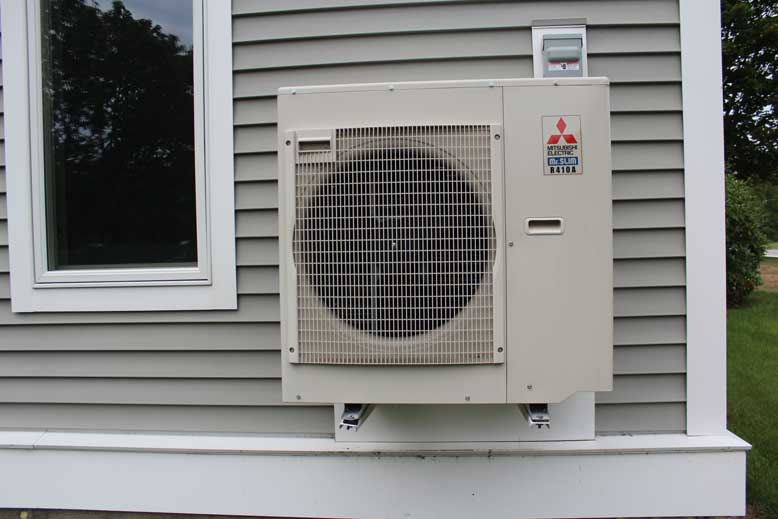Editor’s Note: The following story first appeared in The Maine Monitor’s free environmental newsletter, Climate Monitor, that is delivered to inboxes for every Friday morning. Sign up for the free newsletter to get important environmental news by registering at this link.
The headlines heralding a winter of sky-high home heating costs are growing more alarming by the week. War in Europe has upended the global oil and gas market, stretching domestic fuel supplies thin in the U.S. and driving up prices — all combining with inflation to create deep uncertainty for states, like Maine, that have an outsized reliance on imported fossil fuels to meet winter demand.
This dependence is at the heart of Maine’s intense, years-long push to electrify home heating with heat pumps. Efficiency Maine subsidized the installation of about 30,000 of these systems between 2019 and 2021 and wants to add 50,000 more in the next two years — and many more in the years after that — to meet the goals of the state’s 2020 climate action plan, which aims to make Maine carbon-neutral by 2045. Heat pump technology can also power hot water heaters and provide air cooling, and state research shows it’s increasingly efficient even in the coldest Maine weather.
The current economic and climatic instability only serves to underscore the reasons the state has long focused on heat pump adoption. Sixty percent of Maine homes — three of every five — keep warm using fuel oil, far more than any other state in the country, according to the federal Energy Information Administration. The EIA also reports that Maine has the highest per-capita energy usage in New England and is chiefly consuming petroleum products, both for transportation — our largest source of emissions — and home heating.
The state believes heat pumps are the best answer to Maine’s heating oil problem — a problem of both emissions and economics in a year like this. Not so if you ask heating oil marketers, who last year called on states like Maine to slow their push for heat pump adoption, raising fears that the extra electricity demand would worsen strain on the grid. The grid’s managers said they were not worried about this. And this year, the cost comparison seems even more stark in favor of electrification and a move away from relying on geopolitically sensitive and planet-warming fossil fuels.
The EIA’s recent winter fuels outlook said heating oil users (just 4% of the country overall) can expect to pay 27% more for their winter fuel this year, for an average expenditure of $2,354 for the season. Those who heat with electricity, meanwhile, will see about an 11% bump in the Northeast, for an estimated seasonal cost of $1,679. These increases could vary depending on how temperatures shake out — while it may be unusually cold in parts of the U.S. this winter, the Northeast may see a warmer-than-average season, right in line with climate projections.
The warming climate also brings more extremes in all directions — and if New England were to see a prolonged cold snap this year, grid managers remain worried that limited fuel supply capacity could strain the region’s mostly gas-dependent electric system. “This risk arose most recently in winter 2017-2018, when New England experienced a deep freeze, natural gas supplies became scarce, and the electric system experienced significant operational and market stress,” said the Federal Energy Regulatory Commission in its recent 2022-23 winter assessment.
That freezing 2017-2018 winter was my first living back in New England after spending several years away, and my experiences around that time shaped how I now think about the challenges of winter heating in our northern climate. My husband is from Louisiana and still says the shocking cold, in that first January we spent here, has made it easier for him to cope with comparatively mild winters ever since. I spent that first two freezing weeks of 2018 watching from my nearby office window as the smokestack billowed atop coal-fired Merrimack Station in Bow, N.H. (now the last running coal power plant in New England), called up to supplement the region’s logjammed gas supply. New England burned deeply into its oil reserves that winter, canceling out some emissions benefits from renewable energy adoption. As climate change makes temperatures spike both up and down more often, it will likely happen again.
The next winter I found myself renting an apartment in one of those beautiful but junky, haunted-feeling old Northern New England houses with drafts aplenty, no weatherization to speak of and a heating oil tank rusting in a crawl space, fueling clanky radiators. It’s not much of an exaggeration to say my one winter in that oil-heated home radicalized me. Our heat that season cost about $1,900, and we were cold all the time. The man who inspected the oil tank before winter began was literally a climate change denier. I threw a small tantrum each time I saw the tanker truck drive up outside to resupply us.
We tried plastic-wrapping the windows, wore the extra sweaters and socks, bought space heaters and paid for our oil in advance to try and avoid mid-season price spikes — all to no avail, and with not much more we could do about it as renters (though note that almost anyone can get $100 from Efficiency Maine right now for do-it-yourself home weatherization supplies!). It was simply unaffordable, and the inefficiency and high emissions unconscionable to boot. We moved away the following summer to a boring, new-construction building with propane and electric baseboards, where I’d guess our heating cost well under $1,000 for the season. A worthwhile switch, if you can access it.
I imagine that some readers who grew up with heating oil in one of those drafty old New England homes are rolling their eyes at all this. There is a certain Yankee hardiness to keeping your house chilly and skating by on as little fuel as possible through the long winters, and of course I still try to do that now in yet another new apartment heated with gas. But I have come to feel the same about using oil for home heat in this day and age as I do about burning coal — there is so little that can justify it, when we have such clear and heavily subsidized alternatives like heat pumps that are better for our health, wallets and a rapidly warming planet. A season like this year’s drives this home even more.
The folks at Efficiency Maine, among others, can help if you’re worried about your heating costs or keeping warming this winter. Click here for resources.
To read the full edition of this newsletter, see Climate Monitor: A pricey winter on oil makes the case for heat pumps.
Annie Ropeik has been given the keys to the Climate Monitor newsletter while its regular author, the Monitor’s environmental reporter Kate Cough, is on leave until November. Reach Annie with story ideas at: aropeik@gmail.com.





